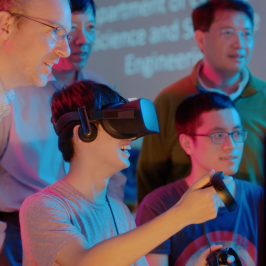
Human-Computer Interaction (HCI) has become one of the most important areas for the success of modern computing technologies and software applications. Specialists with skills in HCI are in great demand to help deliver solutions within increasingly dynamic and complex environments and for increasingly diverse uses.
The MSc Human-Computer Interaction programme aims to address the market demand for HCI professionals able to apply their skills to design, implement, and evaluate traditional and emergent ‘interactive technologies’. This programme integrates the latest research advances in the field of HCI, powering a unique research-led teaching and learning environment. The knowledge and skills offered by this programme can be applied to an ever-growing range of areas:
This programme also offers XJTLU-JITRI joint supervision pathway which leverage the strength from both XJTLU and the research institutes and leading enterprises of Jiangsu Industrial Technology Research Institute (JITRI) to promote in-depth integration between industry, education and research. Through the unique training model integrating specialised module study, industrial research practice and dual supervision mechanism, we aim to cultivate cross-disciplinary talents who are innovative, application-oriented and with high-level international perspective.
Please click here to find more information about XJTLU-JITRI joint Master education.
By the time you graduate from the MSc Human-Computer Interaction programme, you will have:

The university offers a broad range of activities aiming to enrich master students’ theoretical and experiential learning and professional development. Trainings, workshops and seminars, covering varieties of themes and topics, both generic and subject-specific, are often offered at both university and school/department levels. You may also be provided with opportunities to work as a teaching assistant, research assistant, or intern at XJTLU. Depending on the programme, field trips and company visits may be organized, and invited talks may be given by the industrial experts and professionals. Such activities will not only support you in your programme study, but also develop your personal and professional skills and enhance your overall employability.
In addition to offering a solid foundation for future PhD pursuits and careers in research, graduates from this programme will be able to perform roles including:

